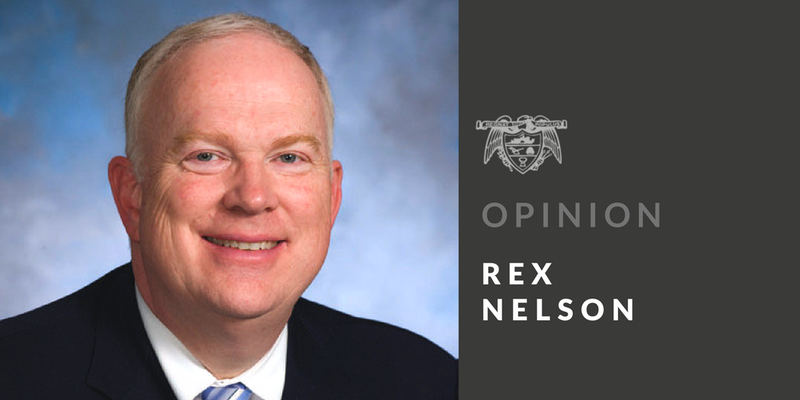For 43 years, what's now Cornerstone Bank (it was the Bank of Eureka Springs for decades) has sent a calendar to customers. Turn to each new month and you'll find a story about the rich history of this part of the state. The story might be from Eureka Springs, Berryville, Harrison or a smaller community in north Arkansas.
On the back of the calendar, there's an annual letter from the bank's chairman, John Fuller Cross, the man I refer to as the Sage of Eureka Springs. I've received dozens of emails from Cross through the years, and they've never failed to be interesting. Cross' family bought controlling interest in the bank in 1929, the first year that Cross' grandfather, Claude Fuller, served in Congress. Fuller spent a decade representing north Arkansas in the U.S. House of Representatives.
I wrote Wednesday about Cross' successful campaign to save Carnall Hall on the University of Arkansas campus. In a 1990 letter to Dan Ferritor, who at the time was the UA chancellor, Cross explained his efforts: "I do know a little something about restoration and preservation as I have been a member of the Eureka Springs Preservation Society since its formation and have served on the state Preservation Board. I have also been very active in the community in its restoration. As you probably know, most of Eureka Springs city proper is on the National Register of Historic Places. We put our money where our mouth is over here, and this entire town has been almost totally restored. But it has taken a lot of time and effort of behalf of a good many people to do so.
"The bank gives a restoration of the month award, we've matched grants, collected old photographs, restored all of our own historical property (both private and corporate), put out an old-time calendar to encourage restoration and preservation, and done other things too numerous to mention. We are presently upgrading and restoring our city auditorium, which was built in 1928, after years of neglect. ... No one ever wants to assume responsibility for this neglect, but I suppose that's just human nature. We have another saying over here, which is kind of our theme, and that is 'we're taking care of what we have and bringing back what we've lost.' Once these old buildings are gone, they're gone forever."
A 2009 feature on Cross in a San Antonio newspaper was headlined "The man who saved a town." Michelle Newman wrote: "Through matching grants and attractive terms at the bank, John was determined and dedicated to salvage Eureka Springs from a premature death. In 1978, when the preservation renaissance began, John saw a need in making these loans readily available to get the struggling town back on its feet. Thanks to John and a handful of other investors, Eureka Springs is a big tourist attraction and one of the major wedding destinations in the country.
"City planners intentionally kept retail and restaurant chains out of the historic downtown, thereby establishing a charming area offering a wide variety of unique galleries, cafes and shops. Eureka Springs has returned to its former glory and is no longer a fading beauty. While he's too humble to admit it, John is the man who is mainly responsible for saving Eureka Springs."
Cross told Newman: "You can't imagine how rundown this town was in 1978. It was a mess. Broken glass, boarded-up buildings."
Cross was born in June 1934 at Hot Springs while his father was working for the National Park Service to build the scenic walkway known as the Promenade. Cross went to work at the bank in 1956. Bob Purvis, who's now in Greenwood but who long led tourism promotion efforts at Eureka Springs, has called the small town "the heart of his heart. He has given his whole life to it."
Cross spent much of his childhood in Maryland while his father was working for the U.S. Department of the Interior and U.S. Department of State. He graduated from high school at Chevy Chase. Cross began work at the bank as a bookkeeper. By 1960, he was a teller. By 1964, he was pretty much running the place.
"God had a plan for my life," Cross told the Northwest Arkansas Democrat-Gazette in 2016. "And that was the plan. Nobody in my family said, 'You've got to take over the bank for your grandfather.' Dad and mother were never in the bank, and grandfather was a lawyer. I never thought about being president of the bank. ... I was just doing my job."
Cross likes to tell the story of his visit with the president of an entertainment company in Dallas. Cross had gone there to urge the executive to build a theme park at Eureka Springs. According to Cross, the man responded: "Boys, you don't need a theme park. You're living in one. Fix it up--clean it up, polish it--and you'll have your theme park."
Cross set out to do just that in time for the city's centennial celebration in 1979. Tacky aluminum siding was removed from downtown structures, several building shells that couldn't be restored were torn down, a museum was established, other buildings were painted, gardens were built around the city's namesake springs, and motorized trolleys were added for tourists.
Cross describes it this way: "We didn't carnivalize this thing and bring stagecoaches back. We danced with what brung us. We were bringing back what we lost."
------------v------------
Senior Editor Rex Nelson's column appears regularly in the Arkansas Democrat-Gazette. He's also the author of the Southern Fried blog at rexnelsonsouthernfried.com.
Editorial on 05/23/2020
